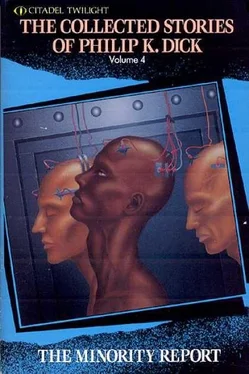"Sorry, sir," the client opposite his desk mumbled apologetically. "I guess I'm boring you."
"Not at all," Slade said, reawakening to his onerous duties. "Let's see…" He examined the papers which the client, a Mr. Walter Grossbein, had presented to him. "Now you feel, Mr. Grossbein, that your most favorable chance to elude military service lies in the area of a chronic ear-trouble deemed by civilian doctors in the past acute labyrinthitis. Hmmm." Slade studied the pertinent documents.
His duties – and he did not enjoy them – lay in locating for clients of the firm a way out of military service. The war against the Things had not been conducted properly, of late; many casualties from the Proxima region had been reported – and with the reports had come a rush of business for Concord Military Service Consultants.
"Mr. Grossbein," Slade said thoughtfully, "I noticed when you entered my office that you tended to list to one side."
"Did I?" Mr. Grossbein asked, surprised.
"Yes, and I thought to myself, That man has a severe impairment of his sense of balance. That's related to the ear, you know, Mr. Grossbein. Hearing, from an evolutionary standpoint, is an outgrowth of the sense of balance. Some water creatures of a low order incorporate a grain of sand and make use of it as a drop-weight within their fluid body, and by that method tell if they're going up or down."
Mr. Grossbein said, "I believe I understand."
"Say it, then," Jesse Slade said.
"I – frequently list to one side or another as I walk."
"And at night?"
Mr. Grossbein frowned, and then said happily, "I, uh, find it almost impossible to orient myself at night, in the dark, when I can't see."
"Fine," Jesse Slade said, and begin writing on the client's military service form B-30. "I think this will get you an exemption," he said.
Happily, the client said, "I can't thank you enough."
Oh yes you can, Jesse Slade thought to himself. You can thank us to the tune of fifty dollars. After all, without us you might be a pale, lifeless corpse in some gully on a distant planet, not far from now.
And, thinking about distant planets, Jesse Slade felt once more the yearning. The need to escape from his small office and the process of dealing with gold-bricking clients whom he had to face, day after day.
There must be another life than this, Slade said to himself. Can this really be all there is to existence?
Far down the street outside his office window a neon sign glowed night and day. Muse Enterprises, the sign read, and Jesse Slade knew what it meant. I'm going in there, he said to himself. Today. When I'm on my ten-thirty coffee break; I won't even wait for lunch time.
As he put on his coat, Mr. Hnatt, his supervisor, entered the office and said, "Say, Slade, what's up? Why the fierce trapped look?"
"Um, I'm getting out, Mr. Hnatt," Slade told him. "Escaping. I've told fifteen thousand men how to escape military service; now it's my turn."
Mr. Hnatt clapped him on the back. "Good idea, Slade; you're overworked. Take a vacation. Take a time-travel adventure to some distant civilization – it'll do you good."
"Thanks, Mr. Hnatt," Slade said, "I'll do just that." And left his office as fast as his feet would carry him, out of the building and down the street to the glowing neon sign of Muse Enterprises.
The girl behind the counter, blonde-haired, with dark green eyes and a figure that impressed him more for its engineering aspects, its suspension so to speak, smiled at him and said, "Our Mr. Manville will see you in a moment, Mr. Slade. Please be seated. You'll find authentic nineteenth century Harper's Weeklies over on the table, there." She added, "And some twentieth century Mad Comics, those great classics of lampoonery equal to Hogarth."
Tensely, Mr. Slade seated himself and tried to read; he found an article in Harper's Weekly telling that the Panama Canal was impossible and had already been abandoned by its French designers – that held his attention for a moment (the reasoning was so logical, so convincing) but after a few moments his old ennui and restlessness, like a chronic fog, returned. Rising to his feet he once more approached the desk.
"Mr. Manville isn't here yet?" he asked hopefully.
From behind him a male voice said, "You, there at the counter."
Slade turned. And found himself facing a tall, dark-haired man with an intense expression, eyes blazing.
"You," the man said, "are in the wrong century."
Slade gulped.
Striding toward him, the dark-haired man said, "I am Manville, sir." He held out his hand and they shook. "You must go away," Manville said. "Do you understand, sir? As soon as possible."
"But I want to use your services," Slade mumbled.
Manville's eyes flashed. "I mean away into the past. What's your name?" He gestured emphatically. "Wait, it's coming to me. Jesse Slade, of Concord, up the street, there."
"Right," Slade said, impressed.
"All right, now down to business," Mr. Manville said. "Into my office." To the exceptionally-constructed girl at the counter he said, "No one is to disturb us, Miss Frib."
"Yes, Mr. Manville," Miss Frib said. "I'll see to that, don't you fear, sir."
"I know that, Miss Frib." Mr. Manville ushered Slade into a well-furnished inner office. Old maps and prints decorated the walls; the furniture – Slade gaped. Early American, with wood pegs instead of nails. New England maple and worth a fortune.
"Is it all right…" he began.
"Yes, you may actually sit on that Directorate chair," Mr. Manville told him. "But be careful; it scoots out from under you if you lean forward. We keep meaning to put rubber casters on it or some such thing." He looked irritated now, at having to discuss such trifles. "Mr. Slade," he said brusquely, "I'll speak plainly; obviously you're a man of high intellect and we can skip the customary circumlocutions."
"Yes," Slade said, "please do."
"Our time-travel arrangements are of a specific nature; hence the name 'Muse.' Do you grasp the meaning, here?"
"Urn," Slade said, at a loss but trying. "Let's see. A muse is an organism that functions to -"
"That inspires," Mr. Manville broke in impatiently. "Slade, you are – let's face it – not a creative man. That's why you feel bored and unfulfilled. Do you paint? Compose? Make welded iron sculpture out of spaceship bodies and discarded lawn chairs? You don't. You do nothing; you're utterly passive. Correct?"
Slade nodded. "You've hit it, Mr. Manville."
"I've hit nothing," Mr. Manville said irritably. "You don't follow me, Slade. Nothing will make you creative because you don't have it within you. You're too ordinary. I'm not going to get you started finger-painting or basket-weaving; I'm no Jungian analyst who believes art is the answer." Leaning back he pointed his finger at Slade. "Look, Slade. We can help you, but you must be willing to help yourself first. Since you're not creative, the best you can hope for – and we can assist you here – is to inspire others who are creative. Do you see?"
After a moment Slade said, "I see, Mr. Manville. I do."
"Right," Manville said, nodding. "Now, you can inspire a famous musician, like Mozart or Beethoven, or a scientist such as Albert Einstein, or a sculptor such as Sir Jacob Epstein – any one of a number of people, writers, musicians, poets. You could, for example, meet Sir Edward Gibbon during his travels to the Mediterranean and fall into a casual conversation with him and say something to this order… Hmmm, look at the ruins of this ancient civilization all around us. I wonder, how does a mighty empire such as Rome come to fall into decay? Fall into ruin… fall apart…"
"Good Lord," Slade said fervently, "I see, Manville; I get it. I repeat the word 'fall' over and over again to Gibbon, and due to me he gets the idea of his great history of Rome, the Decline and Fall of the Roman Empire. And -" He felt himself tremble. "I helped."
Читать дальше










